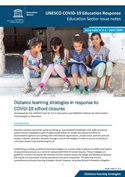distance-learning-guidance-c-raj_bhaskar-shutterstock.jpg

School closures were mandated as part of public health efforts to contain the spread of COVID-19 from February to May 2020 in most countries. Education systems around the world are facing an unprecedented challenge. Governmental agencies are working with international organizations, private sector partners and civil society to deliver education remotely through a mix of technologies in order to ensure continuity of curriculum-based study and learning for all.
Supporting distance learning during COVID-19
UNESCO has been working to mitigate the impact of education disruption and school closures. In response to the pandemic, UNESCO has produced various distance learning resources to support teachers and policy-makers. The following resources offer best practices, innovative ideas and practical information.
Ensuring effective distance learning during COVID-19 disruption: guidance for teachers
This Guidance aims to help teachers understand key issues related to home-based distance learning during COVID-19 school closures and design and facilitate effective learning activities. While UNESCO fully recognizes the complementary relationship between formal and non-formal education, and continuity of studies across education and training levels throughout lifelong learning pathways, this Guidance includes resources, examples and tips for teachers and educators from pre-primary to upper-secondary level.
UNESCO is supporting the organization of several workshops based on the publication Ensuring effective distance learning during COVID-19 disruption: guidance for teachers following a call for proposals that attracted almost 200 entries. The first workshop was held online on 20-21 October 2021, sponsored by the Faculty of Specific Education at Alexandria University in Egypt. Organized by Prof. Mona Sharaf Abdelgalil, the session was attended by 211 teachers from different educational departments, including 80% female teachers. The second set of workshops (six in-person, and one hybrid) took place in Zimbabwe from 5 to 24 November 2021, organized by Learning Factory and Mr Addi Mavengere. These workshops reached a total of 95 participants, including 67% female teachers, 64% from rural communities, and 1% with physical impairment. Six other pilot workshops were held in-person in Ethiopia by Mr Inku Fasil, targeting 120 teachers in Bahirdar, Addis Ababa and Adama from 13 November to 2 December 2021.
Training resources:
Distance learning strategies in response to COVID-19 school closures
These strategies are guided by a concern for equity and inclusion and the need to ensure the design and delivery of distance learning do not exacerbate existing educational and social inequalities. The planning of more comprehensive distance learning strategies should, however, be guided by both immediate mitigation needs and long-term goals. Beyond the response to the current crisis, the efforts to deploy distance learning at scale across all levels of education provides valuable lessons and may lay the foundation for longer-term goals of building more open, inclusive and flexible education systems after the COVID-19 pandemic has passed
COVID 19: Ten recommendations to plan distance learning solutions
UNESCO is sharing ten recommendations to ensure that learning remains uninterrupted during school closures caused by the spread of the pandemic.
National distance learning platforms and tools
A collection of national learning platforms and tools from Member States to facilitate the search for resources in one place.
- More on UNESCO’s response to the COVID-19 impact on education






